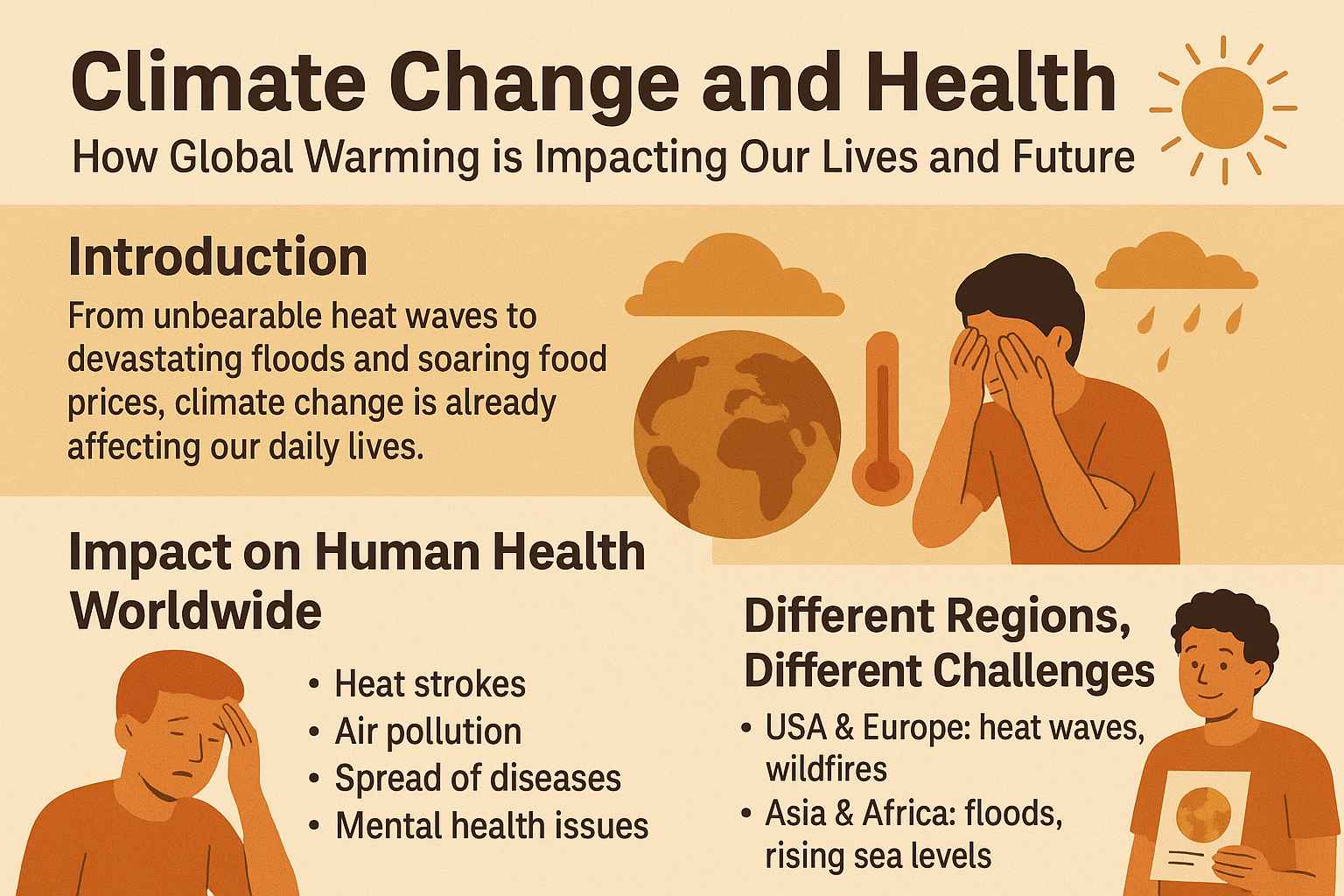Hey there, friend! Picture this: It’s a scorching summer day in your hometown, and you’re sweating bullets just walking to the corner store. Heatwaves like this aren’t just uncomfortable—they’re making folks sick with heatstroke, spiking food prices because crops are wilting, and even causing floods that ruin homes and spread diseases. That’s climate change sneaking into our daily lives, not some far-off sci-fi plot. Whether you’re in a bustling city or a quiet village, global warming is messing with our health in ways we can’t ignore. In this chatty post, we’ll break it down simply, like we’re grabbing coffee. We’ll cover what it is, how it’s hitting our bodies and minds, regional quirks, costs, who’s fighting back, what you can do, and a hopeful peek at the future. Stick around—it’s eye-opening, with a dash of humor to keep things light. After all, if we can’t laugh a bit while saving the planet, what’s the point?
What Is Climate Change? Let’s Keep It Real Simple
Okay, no fancy jargon here. Climate change is basically Earth’s way of saying, “Hey humans, chill out with the pollution!” It’s when our planet’s average temperature rises because we’re pumping too much greenhouse gases—like carbon dioxide from cars, factories, and even cow burps—into the air. These gases trap heat, making the world warmer, like wrapping the globe in a cozy blanket that’s way too thick.
Think of it as your body’s fever: A little warmth is fine, but too much throws everything off. We’ve been burning fossil fuels since the Industrial Revolution, and now oceans are rising, weather’s going wild, and ice caps are melting faster than ice cream on a hot sidewalk. The result? More extreme events that affect everything from the air we breathe to the food we eat. Fun fact: Without action, we’re looking at even hotter days ahead. But don’t panic—we’ll get to solutions soon!
Impact on Human Health Worldwide: It’s Not Just a Sunburn
Alright, let’s talk health—because climate change isn’t just about polar bears; it’s hitting us humans hard. From heat strokes to sneaky diseases, it’s like a villain in a movie, attacking from all angles.
First off, extreme heat is a killer. We’re talking heatwaves causing strokes and heart issues, especially for the elderly or outdoor workers. Between 2019 and 2023, people faced 46 extra days of dangerous heat each year. Air pollution worsens too—wildfires and dust storms fill the skies with junk that irritates lungs, leading to asthma spikes and respiratory diseases.
Then there’s the spread of bugs and diseases. Warmer temps let mosquitoes thrive in new places, bringing malaria, dengue, and Zika closer to home. By 2030-2050, expect 250,000 extra deaths yearly from malnutrition, malaria, diarrhea, and heat stress. Real-life example: In 2024, dengue cases surged in parts of Europe, where it was once rare.
Don’t forget mental health—floods and disasters leave folks anxious, depressed, or traumatized. It’s called “eco-anxiety,” and it’s real. Joke time: Climate change is like that friend who overstays their welcome and then stresses you out about it! Overall, these impacts hit vulnerable groups hardest, like kids, the poor, and indigenous communities.
Different Regions, Different Challenges: No One’s Spared
Climate change plays favorites—or rather, unfavorites—depending on where you live. It’s like a bad lottery: Everyone gets a ticket, but some prizes are worse. Let’s break it down by region with some real examples.
- USA & Europe: Heatwaves and Wildfires Galore
In the US, heat events rack up $1 billion in healthcare costs annually. Remember the 2023 wildfires in California? They blanketed cities in smoke, causing breathing issues for millions. Europe isn’t far behind—2022’s heatwave killed thousands, and it’s only getting hotter, straining hospitals and economies. - Asia & Africa: Floods and Water Scarcity Blues
Asia faces mega-floods, like Pakistan’s 2022 deluge that displaced 33 million and spread cholera. In Africa, droughts dry up water sources, leading to malnutrition and conflicts over resources. Imagine walking miles for dirty water—that’s daily life for many, worsening diseases like diarrhea. - Small Island Nations: Rising Seas Swallowing Homes
Places like the Maldives or Fiji are sinking fast. Sea levels rise, salting freshwater and eroding land, forcing relocations. Health-wise? More storms mean injuries, and lost homes spike mental health crises. These spots are climate canaries—first to feel the pain, with projections showing entire communities displaced by 2050. Heartbreaking, right? But it highlights why global action matters.
No matter the region, it’s interconnected— a drought in Africa hikes food prices worldwide.
Economic and Social Costs: The Bill’s Coming Due
Whew, the price tag on this? Astronomical. Climate change is slamming healthcare systems and insurance like a wrecking ball. Globally, extra health burdens could cost $8.6 to $20.8 trillion by mid-century. In the US alone, disasters like hurricanes rack up billions in medical bills and lost workdays.
Healthcare gets overwhelmed: More patients from heat or floods mean longer waits and strained resources. Insurance? Premiums skyrocket as claims pour in—think flooded homes leading to mold-related illnesses. Socially, it’s unequal: Poor communities bear the brunt, widening gaps. For instance, low-income families might skip meds to afford rising energy bills during heatwaves. And businesses? They lose productivity when workers fall ill. It’s like paying for a party no one wanted—expensive and exhausting.
What Governments & WHO are Doing Globally: Teamwork Makes the Dream Work
Good news: Folks in power aren’t napping. Governments worldwide are stepping up, from the US’s Inflation Reduction Act pushing clean energy to Europe’s Green Deal aiming for net-zero by 2050. In 2025, the UN pushed for renewable transitions, noting it’s inevitable and beneficial.
The WHO? They’re climate health champs, working for over 25 years on this. Their ATACH initiative helps countries build resilient health systems, like heat action plans for workplaces and events. In May 2025, they approved a bold action plan for member states to cut emissions and boost health co-benefits. Think: Cleaner air from less pollution, reducing diseases. Globally, alliances like the Climate Action Network hold governments accountable to Paris Agreement goals. It’s not perfect—some drag feet—but progress is happening.
How Individuals Can Contribute: You Got This!
Feeling overwhelmed? Don’t be—you’re powerful! Small habits add up, like drops in an ocean (pun intended). Here’s how to pitch in:
- Go Eco-Friendly in Daily Life: Swap to LED bulbs, unplug gadgets, and save energy at home. It cuts your carbon footprint and bills!
- Adopt Sustainable Habits: Walk, bike, or take public transport instead of driving solo. Eat more plants—less meat means fewer emissions. Bonus: Healthier you!
- Spread Awareness: Talk to friends, vote for green policies, and support eco-brands. Real example: My buddy started a community garden, reducing food miles and building bonds.
Humor alert: If we all recycle like pros, maybe the planet will recycle some good karma back! Seriously, actions like ditching single-use plastics or flying less make waves.
Future Outlook: Tech, AI, and Green Energy to the Rescue
Looking ahead? It’s bright if we harness tech. Green energy like solar and wind is booming, slashing emissions and creating jobs. By 2030, it could power healthier cities with cleaner air.
AI’s a star player: It optimizes energy use, predicts disasters, and even designs efficient farms. Advancements could cut global emissions by 3.2-5.4 gigatons yearly in key sectors. Imagine AI forecasting heatwaves to save lives or managing grids for renewables. Digital health tools reduce travel for check-ups, cutting carbon while improving access. Challenges? AI’s energy hunger, but efficient algorithms are fixing that. Overall, tech’s our ally in dodging health risks.
Conclusion: Your Steps Spark Global Change
We’ve journeyed through the tough stuff—how climate change zaps our health, varies by region, costs a fortune, and more. But remember, friend: Governments and WHO are on it, tech’s innovating, and you? Your choices matter. Start small—recycle, vote green, eat local—and watch the ripple effect. As one wise saying goes, “We don’t inherit the Earth from our ancestors; we borrow it from our children.” Let’s hand them a healthier planet. You’ve got the power—let’s make it happen! Drop your thoughts below. Stay cool (literally)!

मैं Saurabh, एक टेक-प्रेमी ब्लॉगर और डिजिटल गाइड हूं। Saurabh Blogger पर मैं आसान भाषा में टेक्नोलॉजी की जानकारी, भरोसेमंद ऑनलाइन कमाई टिप्स, निष्पक्ष गैजेट रिव्यू और लेटेस्ट डिजिटल ट्रेंड्स शेयर करता हूं। मेरा मकसद है भारत के युवाओं को डिजिटल रूप से आत्मनिर्भर बनाना।

